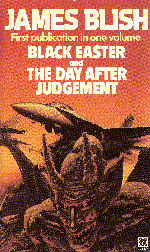Poul Anderson mastered historical fiction, science fiction (sf) and fantasy and even set one novel in each of these genres in the fourteenth century with a minor connection between the historical novel, Rogue Sword, and the sf novel, The High Crusade. (See an earlier post, "Finding an Unexpected Connection" by Sean M Brooks, Wednesday, 9 May, 2012.)
James Blish, with a much smaller output, not only mastered these three genres but also went one step further than Anderson or any other author by writing a three genre Trilogy, After Such Knowledge:
in Volume I, Doctor Mirabilis (a historical novel), Roger Bacon, the founder of scientific method, is suspected of witchcraft and has a drug-induced vision of Armageddon;
in Volume II, (a) Black Easter and (b) The Day After Judgement (contemporary fantasies), magicians release and cannot recall demons who then wage and win Armageddon;
in Volume III, A Case Of Conscience (futuristic sf), experiences on an extra-solar planet oblige a Jesuit biologist to ask heretical questions about the relative powers of God and Satan and to fear an imminent Armageddon.
The Trilogy is thematic, not linear, so it does not matter that Armageddon happens in the late twentieth century yet is still to happen in the mid-twenty first century - although this discrepancy might be resolved by the conclusion of The Day After Judgement, when Satan/God undoes (at least some of) the damage caused by the conflict in order to initiate a long development of mankind towards Godhood. This development could still be occurring in Volume III although, as was the case after the Armageddon in Volume II, the characters' mind-sets have not progressed yet.
The unifying theme of the Trilogy is the question whether the desire for secular knowledge is evil. Blish, like Anderson or any other scientifically trained hard sf writer, answered "No" but he managed to write a Trilogy about the question.
Anderson addressed a single theme in different genres when he presented the original of Odin in a historical novel, a time traveller mistaken for Odin in an sf story and Odin in three fantasy novels. However, this single theme does not make these works a single series. Instead, the contrasting treatments differentiate them as distinct works.
I was reminded of Black Easter, the definitive novel of demonic conjuration, when I read Anderson's account of Queen Skuld's ritual cursing in Hrolf Kraki's Saga. Pagan witchcraft was followed by Christian witchcraft which led, in Blish's fantasy, to Armageddon.

4 comments:
Hi, Paul!
Thanks for the nice mention of me and my note about ROGUE SWORD and THE HIGH CRUSADE. I have been reading your notes. But, most times I find myself merely nodding agreement, which means I've not found many occasions to comment.
I remember from reading HROLF KRAKI'S SAGA how while some of Sjoldung kings of Denmark were given to "peering into things best left alone," that was more often true of the Yyngling kings of early Sweden.
I am not at all sure, however, that pagan witchcraft can be followed by "Christian" witchcraft. While pagans can believe at least some "gods" are evil or treacherous, and thus think they can force or supplicate these gods to do evil, that cannot be the case for Christians.
As a Catholic I believe there is only one supreme, all powerful God who cannot be coerced by magic. And any Christians who turn to worship of Satan for delusionary powers or favors from him are merely apostates.
But witchcraft is a vast subject, far too big for a brief note. So, I'll simply recommend to you Charles Williams book WITCHCRAFT, which focuses largely on post pagan witchcraft. That is, the depraved worship of Satan.
Sean
Perhaps I should say "post-" or "anti-Christian" magic.
Hi, Paul!
Yes, witchcraft as "anti Christian" magic makes sense. And to make it even more confusing, you have to distinguish this kind of witchcraft from the various neo pagan sects today under the headingi of "Wicca" who claim to use "witchcraft". As far as I can make out, neo pagan "witchcraft" seems to be what we might call "worship."
Sean
Yes. I attend "moots", social gatherings, of neo-pagans and have also attended some rituals although my own spiritual practice is Zen.
Post a Comment